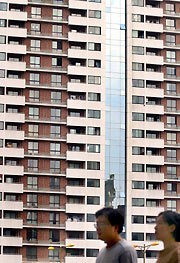Home buyers hurry to clinch deal, avoid tax
By Xue Wen (Shanghai Daily)
Updated: 2006-05-31 06:05 Though some sellers rushed to
clinch a deal by today to evade a tax increase, key analysts expect a slowdown
in transactions in the coming months as market participants need time to digest
the news.
 |
| Residents
in Nanjing, capital of East China's Nanjing Province, walk past a
newly-constructed apartment building May 10, 2005.
[newsphoto] | | Fei
Hongbo, a sales person with Centaline Real Estate Agency, a major property
agency, was at the Minghang District Housing Transaction Center with clients
yesterday.
"The center was full of people that wanted to clinch a deal before June 1,"
he said.
The Shanghai Housing and Land Administration Bureau declined to provide the
latest secondhand home transaction figure, which it doesn't publish regularly.
Data on secondhand home prices usually come from property agencies and analysts.
The new tax policy will extend the applicable period for a 5.5 percent tax on
property transactions to five years from the current two years. The policy
starts tomorrow.
Xu Wei, a 28-year-old professional who is looking to buy an apartment, said
she received three calls from a property agency on Monday after the central
government announced a string of new loan and tax policies.
"All of them cut the previous asking price and want to sign contracts by
tomorrow," Xu said. "But I don't want to make a rash decision as it's hard to
say what will happen to prices."
According to a survey by real estate agent Midland Shanghai, of its 31
outlets across the city, more than 80 percent of sellers chose to keep the
previous quoted price. About 10 percent of sellers, who are under cash flow
pressure, chose to lower the price in hope of signing a deal before the tax
increase. The remainder want to raise the price to transfer the sales tax to
buyers.
The index tracking listed real estate companies unexpectedly posted a 1.55
percent gain to 1,308.6 points yesterday after the regulatory measures were
issued.
"The sector remained relatively stable as major developer stocks had already
seen an average 15 percent drop since the beginning of April when speculation of
more austere measures mounted." said Zhang Qi, an analyst with Haitong
Securities Co Ltd.
"Potential sellers may try to hang on to properties longer and avoid the tax.
This will probably also mean fewer secondhand homes for sale in the near term.
It may drive buyers back to developers who are pre-selling properties." said
Michael Hart, Head of Research, China (North) Jones Lang LaSalle.
|